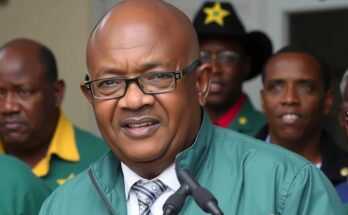The 2024 U.S. presidential election is marked by significant uncertainty, with global anti-incumbent trends raising questions about potential electoral outcomes. Despite a strong economy, public dissatisfaction remains high, complicating the race between Kamala Harris and Donald Trump. Early voting figures are substantial, but the implications of foreign interference and changes to voter rolls add layers of complexity. Both candidates emphasize different visions for America’s future as the election approaches, while concerns over electoral integrity persist.
As the 2024 U.S. presidential election approaches, the global pattern of anti-incumbent sentiment poses a significant question: Will the United States follow suit or defy the trend? Recent electoral outcomes elsewhere, such as the defeat of the Conservative Party in the United Kingdom and the weakening of the African National Congress in South Africa, suggest a growing discontent with incumbents worldwide. Despite the United States experiencing a robust economic performance, with a reported GDP growth of 2.8 percent in the third quarter and record low unemployment, public perception indicates widespread dissatisfaction with the economy and a belief that the nation is headed in the wrong direction. Polling suggests a tight race between incumbent Vice President Kamala Harris and former President Donald Trump, with concerns of a repeat of the polling inaccuracies seen in the previous two elections. Early voting has seen considerable participation, with over 68 million ballots cast, yet the demographics of these voters remain unclear. Furthermore, the Supreme Court has recently allowed Virginia to remove suspected noncitizen names from its voter rolls, though same-day registration mitigates potential issues for citizens. Also, the risk of foreign interference remains high, with various efforts expected to disrupt the electoral process, underscoring the contentious environment as potential misinformation and cyberattacks loom over the elections. In their closing arguments, both Harris and Trump outlined their visions for the future, with Harris emphasizing stability and international alliances, while Trump reiterated his commitment to economic recovery and limiting foreign influence. The outcome of this election holds substantial implications not only for the United States but also for global affairs, as differing policies between the candidates could have far-reaching effects. Pundits and scholars express varied predictions dependent on who prevails in the election, with concerns about potential legal challenges and the integrity of the electoral process remaining a focal point of discussion. With the vote only days away, uncertainty prevails, leaving many to speculate on the ultimate trajectory of American democracy as it faces a critical juncture in 2024.
The 2024 presidential election in the United States unfolds amid global unrest regarding incumbent administrations, with numerous countries experiencing substantial electoral shifts. As domestic sentiments regarding economic conditions diverge significantly from statistical performance, the public’s perception plays a critical role in shaping electoral outcomes. Previous elections have revealed substantial discrepancies between polling data and actual voter preferences, raising questions about the reliability of current polling methodologies. The interplay between the economy, public sentiment, and electoral integrity forms the backdrop for this election, which is further complicated by early voting patterns, legislative changes affecting voter eligibility, and the looming specter of foreign interference in the electoral process.
In summary, the 2024 election presents a pivotal moment for the United States, as it navigates the complexities of domestic economic sentiment, historical polling inaccuracies, and challenges to electoral integrity. With the electorate divided, the outcome remains precarious, and both candidates present starkly different visions for the future. As early voting continues and the day approaches, the unpredictability of the electoral process highlights the need for vigilance and robust engagement from the electorate to ensure a transparent and fair election.
Original Source: www.cfr.org




